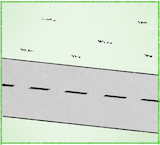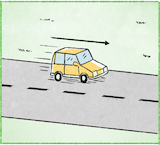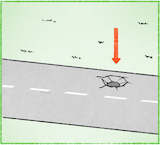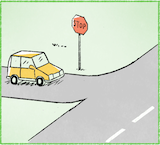



นี้คืออี่หยัง นี้คือหนทาง เป็นหนทางถะหนนค็อนกีด หลือเป็นหนทางถะหนนลาดยางนี้หละ อันนี้กะบ่ฮู้คือกัน
หนทางอันนี้เอาไว้เฮ็ดหญัง เอาไว้ถ้าให้ลดแล่น คนกะสามาดญ่างได้ อันนี้เป็นถะหนน หนทาง เอาไว้ถ้าให้ลดแล่น ลดใหญ่กะได้ ลดจักกะย๊านกะได้ ลดมอเตอไซกะได้ ลดสิบล้อกะได้
อันนี้เป็นหนทาง สามาดแล่นได้ทุกลด ลดอี่หยังกะสามาดแล่นได้
หนทางอันนี้มีปะโยดบ่ กะมีอยู่ มีปะโยดหลาย ลดทุกอย่างสามาดแล่นอยู่เทิงถะหนนหนทางนี้ได้
ขั้นหนทางนี้ดี ลดกะสามาดแล่นง่าย ขั้นหนทางนี้บ่ดี ลดกะแล่นญากขึ้น
10
ลดคันนี้กำลังเฮ็ดหญัง ลดคันนี้กำลังแล่นอยู่
ลดคันนี้กำลังแล่นอยู่เทิงหนทาง แล่นอยู่เทิงหนทางอันนี้หละ
แล้วลดคันนี้สิขับไปใส ลดคันนี้สิแล่นไปใส จักคือกัน อันนี้กะบ่ฮู้คือกัน จักว่าเขาสิแล่นไปใส แต่ว่าลดคันนี้กะแล่นไวเติบ แล่นเล็วคัก ขับเล็วคัก
คือฮู้ว่าลดคันนี้แล่นเล็ว คือฮู้ว่าลดคันนี้ขับเล็ว กะฮู้ เพาะว่าเบิ่งจากล้อ จากความเล็วแล้ว คือสิขับเล็วหลายพุ้นหละ ล้อหมุนบักคักหนึ่ง หมุนเล็วคักขะหนาด แล้วกะลดแล่นไวคัก แล่นไวอี่หลี
11
นี้คืออี่หยัง นี้คือหลุม เป็นหลุมอยู่กางหนทาง หลุมบักใหญ่หนึ่ง ใหญ่บักคัก ใหญ่กะด้อกะเดี้ย ใหญ่อี่หลี
เป็นหญังมันคือมีหลุม อันนี้กะบ่ฮู้คือกัน จักว่าหลุมมันเกิดมาจากอี่หยัง อาดสิลดแล่นเล็ว หลือลดมีความหนัก แล้วกะมาเหยียบหม้องนี้ แล้วเฮ็ดมันเป็นหลุมกะได้
หลุมอันนี้มันตาย้านบ่ กะตาย้านอยู่ เพาะว่าหลุมอันนี้มันอยู่กางหนทาง ขั้นลดขี่มาเล็วๆ แล้วแนมบ่เห็นหลุมอันนี้ แล้วขี่ตกลงไป มันกะสิสะดุด เฮ็ดให้ลดเสียหลัก หลือเกิดอุบะติเหดกะได้
ขั้นฮู้แล้วว่ามันมีหลุม เฮาสิขับลดจั่งใด เฮากะหลบหลุมนี้ หลือขับหลบหลุมอันนี้ออกไป เพื่อที่สิบ่ให้มันตกหลุม
หลุมอันนี้มันลึกบ่ กะสิลึกอยู่ เบิ่งซงแล้วเป็นตาลึกหลาย ลึกบักคักหนึ่ง คือสิลึกอี่หลี
12
นี้คืออี่หยัง นี้คือสามแย้ก
แล้วกะมีลดคันหนึ่ง กำลังจอดอยู่ กำลังหยุดอยู่ หยุดอยู่ตงสามแย้กนั้นหละ หยุดอยู่ตงทางเลี้ยว
เป็นหญังลดคันนี้ต้องหยุด กะต้องหยุด เพาะว่าหยุดเพื่อที่สิเบิ่งลดอยู่ทางตง เพาะว่าเฮามาจากทางแย้ก เฮาสิไปทางตง เฮากะต้องหยุดเบิ่งลดก่อน
ขั้นมีลด เฮากะหยุด ขั้นบ่มีลด เฮากะขับต่อไป
อันนั้นเป็นป้ายอี่หยัง อันนี้เป็นป้ายหยุดลด เพื่อที่เป็นสันญานให้ลดหยุดก่อน ให้หยุดแนมเบิ่งลดดีๆ
ขั้นบ่มีลด เฮากะจั่งขับไป ขั้นมีลด เฮากะต้องหยุดลดก่อน
Link to overview page
Link to dictionary
| Isaan | Pronunciation | Tones | Thai | English/Notes |
|---|---|---|---|---|
| นี้ | ni: | HF | นี้ | 1. this 2. here |
| คือ | khʉ: | HR | คือ | 1. to be, to resemble, like, as 2. why {บักหล้าคือบ่เก็บโต่ะแน่ = [addressing a young boy] Why haven't you cleared the table?} |
| อี่หยัง | i:-yaŋ | H-M | อะไร | 1. what {นี้คืออี่หยัง = What is this?} {มื้อนี้เจ้าเฮ็ดอี่หยัง = What are you doing today?} {กินเข้างายกับอี่หยัง = What did you have for breakfast?} 2. something, anything, (in negations) nothing {บ่ต้องเฮ็ดอี่หยังอีกเลยนอกจากใส่ปุย = [we] don't need to do anything besides adding fertilizer} |
| หนทาง | hon-tha:ŋ | M-HR | ถนน | road, street, way |
| เป็น | pen | M | เป็น | 1. to be, to exist 2. to be able to 3. to suffer, sth. happens to 4. เป็นหญัง[...]คือ in initial position: why? {เป็นหญังเขากะคือแปงฟัน = Why is he brushing his teeth?} {เป็นหญังเคี่ยงบินมันคือสิตก = Why is the airplane falling down?} |
| ถะหนน | tha-non | M-M | ถนน | road, street |
| ค็อนกีด | khɔn-gi:t | HR-LF | คอนกรีต | concrete |
| หลือ | lʉ: | M | หรือ | or |
| ถะหนนลาดยาง | tha-non-la:t-ya:ŋ | M-M-HF-M | ถนนราดยาง | asphalt road, paved road |
| นี้หละ | ni:-la | HF-M | นี่แหละ | auxiliary for emphasis at the end of a phrase |
| อัน | an | M | อัน | 1. thing, object 2. general clf. for objects |
| กะ | ga | M | ก็ | 1. then, consequently 2. also |
| บ่ | bɔ: | H | ไม่ | 1. no, not 2. question particle, transforming a statement into a question Notes: spelling exception in line with common usage on social media |
| ฮู้ | hu: | HF | รู้ | 1. to know 2. to understand Notes: equivalent to ลู้ |
| คือกัน | khʉ:-gan | HR-M | เหมือนกัน | 1. also, likewise, similarly {ยินดีที่ได้ฮู้จักคือกันคับ = Nice to meet you too!} 2. in negative sentences: either {บ่ลู้คือกัน = I don't know either} {จักคือกัน = I don't know (either)} |
| เอา | ao | M | เอา | to take, to give {เขากำลังเอาก่องไปซั่ง = he's taking the boxes to weigh them} {หมอกำลังเอายาให้คนป่วยกิน = the doctor is giving medicine to the patient} {เอาไว้ถ้า = is for, is used for, has the purpose of} |
| ไว้ | wai | HF | ไว้ | 1. to keep, to put, to place, to retain, to save, to reserve {เขาเอาหัวของเขาไว้ใส = Where does she put her head?} {หมาสิเลี้ยงไว้บ้าน = dogs are kept/raised in the house} {ไก่เลี้ยงไว้ในคอก = chicken are kept/raised in a coop} {หน้ามันบังไว้ = the face is covered/not visible} {เขาเอาโทละสับวางไว้หู = he holds the phone to his ear} 2. for {นาลิกาปุกมีไว้เฮ็ดหญัง = What is an alarm clock for?} {หม้อเอาไว้เฮ็ดแนวกิน = a pot is used to make food} {ก่องเอาไว้เฮ็ดหญัง ก่องเอาไว้ใส่ของ = What is the box for? It's for putting in stuff.} Notes: see also ไว้ถ้า |
| เฮ็ด | het | H | ทำ | to do, to make |
| หญัง | ɲaŋ | M | อะไร, เป็นหญัง = ทำไม | 1. what {เขากำลังเฮ็ดหญัง = What is he doing?} {ธูปเอาไว้เฮ็ดหญัง = What are incense sticks for?} 2. something, anything, (nothing) 3. เป็นหญัง[...]คือ in initial position: why {เป็นหญังเขาคือใส่บักพิกลงไปในกวยเตียว = Why is he putting chili in [his] noodle soup?} {เป็นหญังหน้าต่างมันคือเปิด = Why is the window open?} {เป็นหญังมันคือมีควนไฟ = Why is there smoke?} |
| ไว้ถ้า | wai-tha: | HF-LF | usually in a positive statement or answer: is for, is used for, has the purpose of {กะทะมีไว้ถ้าทอด = a pan is for frying} {น้ำบักนาวมีไว้ถ้าปุงอาหาน = lime juice is used to season food} {ปากกามีไว้ถ้าเขียน = a pen is for writing} {กะเทียมเอาไว้ถ้าเฮ็ดแนวกิน = garlic is used to make food} {ขาเอาไว้ถ้าญ่าง = legs are for walking} {เกิบเอาไว้ถ้าใส่ = shoes are for wearing} Notes: see also ไว้ |
|
| ให้ | hai | LF | ให้ | 1. to give {หมอกำลังเอายาให้คนป่วยกิน = the doctor is giving the patient medicine} 2. for 3. to allow, to be allowed |
| ลด | lot | H | รถ | 1. car, motorized vehicle 2. vehicle, cart {ลดขายแนวกิน = food cart} |
| แล่น | lɛ:n | H | วิ่ง | to run {ไก่กำลังแล่น = the chicken is running} {เด็กน้อยกะแล่นเหล้น = the kids are running around} {ลดไฟกำลังแล่น มันแล่นอยู่เทิงลาง = the train is running, it's running on rails} {เลียแล่นไปแล่นมา = ships are going back and forth} |
| คน | khon | HR | คน | person, people |
| สามาด | sa:-ma:t | M-HF | สามารถ | can, to be able |
| ญ่าง | ɲa:ŋ | H | เดิน | to walk {เขากำลังญ่างเว้ากัน = they are walking and talking} {ลูกเป็ดญ่างไปนำแม่เป็ด = the ducklings are [walking] following their mother} {เขากำลังญ่างข้ามสะพาน = she's walking over the bridge} {เขาสิญ่างไปใส = Where is he going?} |
| ได้ | dai | HF | ได้ | 1. can 2. to get, to obtain 3. before verb: indicating past tense 4. บ่ได้ + verb: not |
| ใหญ่ | ɲai | H | ใหญ่ | large, big |
| จักกะย๊าน | jak-ga-ya:n | M-M-HR | จักรยาน | bicycle |
| มอเตอไซ | mɔ:-tə:-sai | HR-M-HR | มอเตอร์ไซค์ | motorbike |
| ลดสิบล้อ | lot-sip-lɔ: | H-M-HF | รถสิบล้อ | ten-wheeler, truck |
| ทุก | thuk | H | ทุก | every Notes: also pronounced ทุ as in ทุมื้อๆ = everyday, always |
| มี | mi: | HR | มี | 1. to have 2. there is |
| ปะโยด | pa-yo:t | M-LF | ประโยชน์ | 1. benefit 2. useful |
| อยู่ | yu: | H | อยู่ | 1. to be (located) at 2. yet, still 3. auxiliary indicating continuous or progressive action {ทอดปาอยู่ในกะทะ = (in the process of) frying a fish in the pan} {แม่กำลังเมี้ยนเฮียนอยู่ = mother is cleaning/tidying up the house} |
| หลาย | la:i | M | เยอะ, มาก | many, much, very |
| อย่าง | ya:ŋ | H | อย่าง | type, kind, sort, category |
| เทิง | thə:ŋ | HR | บน | 1. on, on top of, at, in {เทิงโต่ะ = at/on the table} {กบมันนั่งอยู่เทิงใบบัว = the frog is sitting on the lotus leaf} {เทิงท้องฟ้า = in the sky} {มันแล่นอยู่เทิงลาง = [the train] runs on rails} {มีคนนั่งอยู่เทิงลดสามล้อสามคน = there are three people sitting in the tuk tuk} 2. up, upward Notes: pronunciation: also realized as ทัง |
| ขั้น | khan | LF | เมื่อ | when, if |
| ดี | di: | M | ดี | good |
| ง่าย | ŋa:i | H | ง่าย | easy, simple, clear |
| ญาก | ɲa:k | HF | ยาก | difficult, hard |
| ขึ้น | khʉn | LF | ขึ้น | 1. to go up, to increase 2. sun: to rise {ตะเว็นกำลังขึ้น = the sun is rising} 3. more 4. bus/train etc.: to get on, to board {พุโดยสานขึ้นลดไฟเบิดแล้ว = all passengers have boarded the train} |
| คัน | khan | HR | คัน | clf. for cars, trains, motorbikes, boats {ลดไฟคันนี้ = this train} {ลดเก็งคันสีเขียวคันน้อย = a small green car} |
| กำลัง | gam-laŋ | M-HR | กำลัง | auxiliary indicating continuous or progressive action |
| แล้ว | lɛ:o | HF | แล้ว | 1. finished 2. already 3. and then, and next (especially แล้วกะ) 4. auxiliary for past tense |
| สิ | si | M | จะ | future tense auxiliary {เขากำลังสิตื่น = he's about to wake up} {สิไปตะหลาด = [I'm] going to the market} |
| ขับ | khap | M | ขับ | to drive, to ride |
| ไป | pai | M | ไป | 1. to go 2. auxiliary indicating action extending into the future |
| ใส | sai | M | (ที่)ไหน | 1. where? {สิไปใส = Where are [you] going?} {มาแต่ใส = Where are [you] coming from?} {กะทะอยู่ใส = Where's the pan?} 2. somewhere, anywhere {ใสกะได้ = anywhere, wherever you like} |
| จัก | jak | M | จัก | 1. answer to a question: [I] don't know, don't know exactly, [I'm] not sure {พุซายคนนี้เขาเถ้าไป่ จัก จักเถ้าหลือบ่เถ้า เบิ่งบ่ค่อยออก = Is this man here already old? I don't know. I can't see clearly whether he's old or not.} {เขาเว้ากันอยู่ใส จักคือกัน = Where are they talking? I don't know either.} 2. exact(ly), what exactly {จักต้มอี่หยังกะบ่ฮู้ = I don't know what (exactly) he is cooking} {บ่ลู้คือกันจักปาอี่หยัง = I don't know either what kind of fish this is} 3. how much/many? {ต้นไม้มีจักต้น = How many trees are there?} {ตอนนี้จักโมงแล้ว = What time is it now?} {มือของเฮานี้สิมีจักนิ้ว = How many fingers do our hands have?} 4. a bit, a little bit {จักหน่อย/จักหน่อยหนึ่ง = a bit, a little bit} |
| ว่า | wa: | H | ว่า | 1. that, as {คำว่า X = the word X} 2. to say |
| เขา | khao | M | เขา | personal pronoun: he, she |
| แต่ว่า | tɛ:-wa: | H-H | แต่ว่า | 1. but 2. only {ฮู้แต่ว่าเขายืนอยู่พุเดียว = I only know that he's standing there by himself} |
| ไว | wai | HR | ไว | quick, fast, speedy |
| เติบ | tə:p | LF | intensifier: very, much {เว้ากันโดนเติบ = to talk a long time} | |
| เล็ว | leo | HR | เร็ว | fast, quick |
| คัก | khak | H | intensifier: very, very much | |
| เพาะว่า | phɔ-wa: | H-H | เพราะว่า | because |
| เบิ่ง | bəŋ | H | ดู | 1. to look at, to see, to watch {เบิ่งโทละทัด = to watch TV} {เบิ่งหนัง = to watch a movie} 2. to guess {เบิ่งซงแล้ว ... = [I] guess / from what it looks like ...} |
| จาก | ja:k | LF | จาก | 1. from {... เฮ็ดมาจากอี่หยัง = ... is made from what?} 2. to depart |
| ล้อ | lɔ: | HF | ล้อ | wheel |
| ความ | khwa:m | HR | ความ | 1. prefix: state, condition, quality 2. content, subject, matter, affair |
| พุ้นหละ | phun-la | HF-M | นู่นแหละ | auxiliary for emphasis at the end of a phrase Notes: see also พุ้นหนะ |
| หมุน | mun | M | หมุน | to turn, to rotate {เขากำลังหมุนปิดก่อกน้ำ = he's turning off the tap} {พัดลมหมุน = the fan is running/rotating} |
| บักคักหนึ่ง | bak-khak-nʉŋ | M-H-H | intensifier: very, very much (variant of คัก) | |
| ขะหนาด | kha-na:t | M-LF | ขนาด | 1. size, dimension, magnitude 2. also used as an intensifier {หมุนเล็วคักขนาด = [is] turning very fast} |
| อี่หลี | i:-li: | H-M | จริง | intensifier: really Notes: pronunciation: also realized as อี่หลิ |
| หลุม | lum | M | หลุม | hole, pit |
| กาง | ga:ŋ | M | กลาง | middle, center |
| บัก | bak | M | 1. intensifier before adjectives {ปาโตบักใหญ่ = a (very) large fish} 2. prefix in front of fruits and vegetables {บักแตงโม = watermelon} 3. can be used as a reference for a male person of the same or younger age {บักอันนี้ = this lad} |
|
| หนึ่ง | nʉŋ | H | หนึ่ง | 1. one 2. after adjective: intensifier {บักคักหนึ่ง = very much} {อันบักใหญ่หนึ่ง = very large}, or attenuates the meaning {กะดาดมันแผ่นน้อยๆ หนึ่ง = the piece of paper is [relatively] small} |
| บักคัก | bak-khak | M-H | intensifier: very, very much (variant of คัก) | |
| กะด้อกะเดี้ย | ga-dɔ:k-ga-di:a | M-HF-M-HF | มากมาย, มากเกินไป | intensifier: very, very much |
| มัน | man | HR | มัน | it (also used to refer to people) |
| เกิด | gə:t | LF | เกิด | 1. (often together with ขึ้น) to happen, to arise, to take place {เกิดอี่หยังขึ้น = what is happening?} {บ่มีหญังเกิดขึ้น = nothing's happening} 2. to be born 3. to grow {หนวดกะคือสิเกิดอยู่ใต้ดัง = a moustache grows below the nose} |
| มา | ma: | HR | มา | 1. to come 2. auxiliary expressing action towards the present or focal time {กะคุเฮ็ดมาจากอี่หยัง = What is the bucket made of?} {แล้วเขากะเก็บเงินจากพุนั้นมา = and then she takes the money of that person} |
| อาด | a:t | LF | อาจ | 1. might, may, will 2. likely |
| หนัก | nak | M | หนัก | heavy |
| เหยียบ | yi:ap | LF | เหยียบ | to step on, to tread on, to run over |
| หม้อง | mɔŋ | LF | ที่, แห่ง, บริเวณ | 1. place, area {หลายที่หลายหม้อง = in many places} {หม้องใดหม้องหนึ่ง = some place} 2. clf. for places |
| ตาย้าน | ta:-ya:n | M-HF | น่ากลัว | scary, not safe |
| ขี่ | khi: | H | ขี่ | to ride, to drive {ขี่มอเตอไซ = to ride a motorbike} {ขี่ควย = to ride on a buffalo} {ขี่เลีย = to take or travel on a boat} |
| แนม | nɛ:m | HR | มอง | to look, to glance, to stare {เขากำลังยืนแนมก้อนหินอยู่ = he's standing and looking at the stone/rock} {ข้างหนึ่งแนมเห็น อีกข้างหนึ่งแนมบ่เห็น = [we] see one side, [we] can't/don't see the other side} |
| เห็น | hen | M | เห็น | to see |
| ตก | tok | M | ตก | 1. to fall, to drop 2. sun: to set {ตะเว็นตกดิน = the sun is setting} |
| ลง | loŋ | HR | ลง | 1. to descend, to lower, to go down 2. down 3. bus/train etc.: to get off, to disembark {คนกำลังลงลดบั่ด = people are getting off the bus} 4. boat/ship etc.: to get on, to board {เขากำลังญ่างลงเลีย = he's boarding/getting on the boat} |
| สะดุด | sa-dut | M-M | สะดุด | to stumble, to trip, to fall |
| เสียหลัก | si:a-lak | M-M | เสียหลัก | to lose one's balance |
| อุบะติเหด | u-ba-ti-he:t | M-M-M-LF | อุบัติเหตุ | accident |
| เฮา | hao | HR | เรา | 1. personal pronoun: we 2. personal pronoun: I |
| จั่งใด | jaŋ-dai | H-M | ยังไง, แบบไหน | how, in what manner {บักนาวมันมีลดซาดจั่งใด = Lime fruits have what kind of taste?} {เขาปิดแอจั่งใด = How is he switching off the A/C?} {เทียนใซ้จั่งใด = How's a candle used?} {สิใซ้จั่งใด = how is [it] used?} |
| หลบ | lop | M | หลบ | to avoid, to evade, to dodge {หลบทาง = to give way} |
| ออก | ɔ:k | LF | ออก | 1. to go out, to leave 2. out |
| เพื่อที่ | phʉ:a-thi: | H-H | เพื่อที่ | in order to, so that Notes: the vowel เอือ is likely to be a Thai loan |
| ลึก | lʉk | H | ลึก | deep |
| ซง | soŋ | HR | ทรง | 1. shape, form 2. as if, like Notes: translation to be confirmed |
| ตา | ta: | M | ตา | as a prefix: likely, worthy, fit for (like Thai น่า-) {ตาฮัก = lovely/cute} {ตาสะออน = praiseworthy} {ตาหวาน = (of ice cream) [likely to be] sweet} {ตาอยู่ = to be a good place to be} Notes: see also various entries for ตา-, e.g., ตาแซบ, ตาพู่ฮ้าย, ตาย้าน, ตาอยากหัว, ตาฮัก, ตามีแฮง |
| สามแย้ก | sa:m-yɛ:k | M-HF | สามแยก | T junction |
| จอด | jɔ:t | LF | จอด | to park, to stop |
| หยุด | yut | M | หยุด | to stop |
| ตง | toŋ | M | ตรง | 1. at 2. to be precise at, to be exact {ห้าโมงตง = exactly five o'clock} 3. straight |
| นั้นหละ | nan-la | HF-M | นั่นแหละ | auxiliary for emphasis at the end of a phrase |
| ทางเลี้ยว | tha:ŋ-li:ao | HR-HF | ทางเลี้ยว | turnoff, junction |
| ต้อง | tɔŋ | HF | ต้อง | to have to, must |
| ทาง | tha:ŋ | HR | ทาง | 1. way, direction {พุหญิงกะสิไปทางหนึ่ง พุซายกะสิไปอีกทางหนึ่ง = the woman goes one way, the man another way} {ตะเว็นไปทางใด = Where has the sun gone?} {เขาถีบจักกะย๊านไปทางหน้า = he's biking on/onward/forward} {มาเว้า มาว่าเฮาในทางที่บ่ดี = he's scolding [me], he's talking to me improperly} 2. by, through, via etc. {เว้าทางโทละสับ = to talk on the phone} |
| ทางแย้ก | tha:ŋ-yɛ:k | HR-HF | ทางแยก | crossroad, junction |
| ก่อน | gɔ:n | H | ก่อน | 1. before 2. first, first of all |
| ต่อไป | tɔ:-pai | H-M | ต่อไป | next |
| นั้น | nan | HF | นั้น | that, there |
| ป้าย | pa:i | HF | ป้าย | 1. train/bus stop 2. sign, signboard |
| สันญาน | san-ɲa:n | M-HR | สัญญาณ | signal |
| แนมเบิ่ง | nɛ:m-bəŋ | HR-H | มองดู | 1. to look at 2. to watch |
| จั่ง | jaŋ | H | ค่อย (?) | then, afterwards {ต้องใซ้น้ำมันพ้อม มันจั่งสิทอดได้ = one needs to use oil as well, then one can fry [food]} |